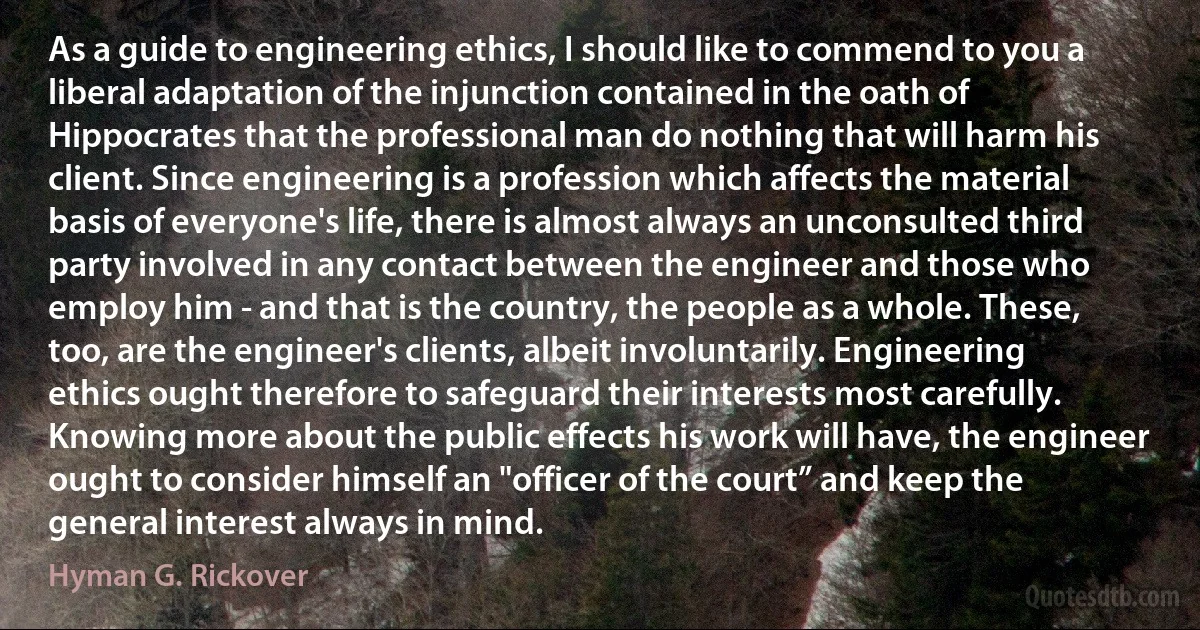
As a guide to engineering ethics, I should like to commend to you a liberal adaptation of the injunction contained in the oath of Hippocrates that the professional man do nothing that will harm his client. Since engineering is a profession which affects the material basis of everyone's life, there is almost always an unconsulted third party involved in any contact between the engineer and those who employ him - and that is the country, the people as a whole. These, too, are the engineer's clients, albeit involuntarily. Engineering ethics ought therefore to safeguard their interests most carefully. Knowing more about the public effects his work will have, the engineer ought to consider himself an "officer of the court” and keep the general interest always in mind.
Hyman G. RickoverRelated topics
adaptation almost country court employ engineer engineering ethics general guide harm hippocrates injunction interest knowing life man mind nothing oath ought party people professional public should third workRelated quotes
People talk about nightfall, or night falling, or dusk falling, and it's never seemed right to me. Perhaps they once meant befalling. As in night befalls. As in night happens. Perhaps they, whoever they were, thought of a falling sun. That might be it, except that that ought to give us dayfall. Day fell on Rupert the Bear. And we know, if we've ever read a book, that day doesn't fall or rise. It breaks. In books, day breaks, and night falls.
In life, night rises from the ground. The day hangs on for as long as it can, bright and eager, absolutely and positively the last guest to leave the party, while the ground darkens, oozing night around your ankles, swallowing for ever that dropped contact lens, making you miss that low catch in the gully on the last ball of the last over.

Hugh Laurie
The power to guess the unseen from the seen, to trace the implication of things, to judge the whole piece by the pattern, the condition of feeling life, in general, so completely that you are well on your way to knowing any particular corner of it - this cluster of gifts may almost be said to constitute experience, and they occur in country and in town, and in the most differing stages of education. If experience consists of impressions, it may be said that impressions are experience, just as (have we not seen it?) they are the very air we breathe. Therefore, if I should certainly say to a novice, "Write from experience, and experience only," I should feel that this was a rather tantalizing monition if I were not careful immediately to add, "Try to be one of the people on whom nothing is lost!"

Henry James
I want to create every opportunity for women to be able to serve this country, and they do so in an amazing and wonderful way and they're a great addition to the- and they have been for a long time- to the- to the armed services of our country. But I do have concerns about women in front-line combat. I think that could be a very compromising situation, where- where people naturally may do things that may not be in the interest of the mission because of other types of emotions that are involved. And I think that's probably- It already happens, of course, with the camaraderie of men in combat, but it's- I think it would be even more unique if women were in combat, and I think that's not in the best interests of men, women or the mission.

Rick Santorum
We must all believe in ourselves and together raise our national banner high as a symbol of freedom so that it can fly sovereignly and definitively over our great fatherland. This will not prevent us from persisting in our tradition as a peace-loving nation and from respecting all world nations, nor will it prevent us from resuming with dignity, through friendly gestures stemming from our natural generosity, diplomatic negotiations which may give an institutional basis to the situation which we have achieved, clearly safeguard- ing those legitimate interests we have always respected. Our arms will always be extended to conclude noble commitments and to forget past offences for the sake of building a peaceful future for the civilized world. Glory to the great Argentine people.

Leopoldo Galtieri
The professional administrators - especially those at higher levels - serve key roles at the boundary of the organization, between the professionals inside and interested parties - governments, client associations, and so on - on the outside. On the one hand, the administrators are expected to protect the professionals' autonomy, to "buffer" them from external pressures. On the other hand, the administrators are expected to woo these outsiders to support the organization, both morally and financially. Thus, the external roles of the manager-maintaining liaison contacts, acting as figurehead and spokesman in a public relations capacity, negotiating with outside agencies-emerge as primary ones in professional administration.

Henry Mintzberg
